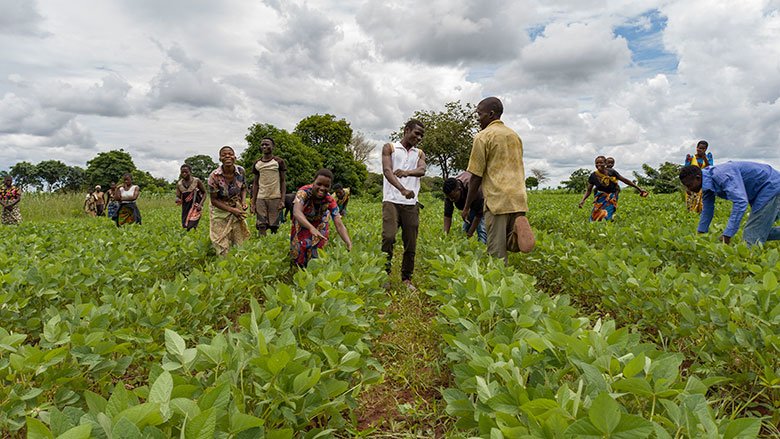LILONGWE, April 26, 2022—Unlike other university students who would wait for employment or other opportunities after graduation, a group of six classmates from Lilongwe University of Agriculture and Natural Resources (LUANAR) had their future planned before leaving college.
In between classes, Hastings Nhlane, Madalitso Chipekwe, Hope Msolola, Ian Tumeo, Edward Kenamu, and Chrissy Jafali, often met to discuss the need for an agricultural collective that could contribute to agricultural development, create jobs and provide support for farmers. From those recurrent discussions, these students combined their agricultural backgrounds for a common good, and , the idea for ACADES Youth Famers Association was born.
Making agribusiness a viable option for youth
With more than 3,000 members, ACADES is the largest youth agribusiness network in the country. Ove the past five years, ACADES has invested in, provided financing for, and trained more than 20,000 youth farmers, and they are investing in sustainable solutions for farmers to increase their productivity and improve their livelihoods.
“We were studying different programs at LUANAR, but we strongly thought if we came up together and share our ideas, we could come up with a joint initiative worth pursuing after graduating,” explained Nhlane, a graduate in general agriculture and a co-chairperson of ACADES.
Current members of the association, both young women and men, are engaged in production of certified soyabean seed, soyabean grain and common beans. Creating ACADES was not just out of the desire to implement classroom theories and make a contribution to national development, but it was further designed to solve problems that many youth farmers are currently facing in Malawi.
Founding member and co-chairperson Madalitso Chipekwe said it was also a way to ensure they had jobs when they finish their schooling.
"We started ACADES in 2013 after graduating, and the main reason was to create employment for ourselves because we did not want to wait for employment,” she said. Now, ACADES is increasing job opportunities for young farmers in various areas of agribusiness, by adding value to raw crops for both local consumption and exportation, according to Nhlane.
ACADES has several buyers of agricultural goods locally and internationally according to Nhlane, which has also helped increase resources for the association allowing them to expand. In the farming season 2021/22, they are projecting to produce 1000 metric tons of soyabean grain for export to Kenya and South Africa.
A boost from the World Bank
With such level of organization, ACADES has earned itself a $184,000 matching grant from the World Bank-supported Malawi Agriculture Commercialization (AGCOM) Project. The grant, which is part of the $95 million project’s goal to increase commercial farming in Malawi, targets organized farmer groups to improve their production capacity and link them with buyers. As part of the demonstrating commitment, farmer groups who submit proposals must contribute 30% of the funds requested. ACADES met the requirements, and the resources have already improved their capacity to grow more, and generate high quality farm produce.
The association is also constructing a state-of-the-art multipurpose structure at Mpingu in Lilongwe which will house a factory, warehouse, and administration offices. Though still under construction, the imposing structure is already changing the rural face of the area. More than 50 people have also been employed at the construction site.
“The factory will help us add value to our products, and the warehouse will reduce the storage cost,” Nhlane boasted during a recent tour of the area. “We really want to make this place a center of excellence. We will also have irrigation facilities installed here so that we are not heavily dependent on rains.”
The structure sits on an extended land covering seven hectares, which is earmarked to be developed into an agro-industrial park.
Managing post-harvest losses
For several years, ACADES has been renting out storage facilities for soyabean grain, hence reducing the revenue for the farmers and the association. Lack of a storage facility for members, especially seed producers, are forced to keep the commodity in their houses for longer periods while waiting for the marketing period. As a result, farmers have been losing huge quantities of produce due to the poor storage conditions and sometimes, theft.
The warehouse will solve most of the farmer’s storage problems.
“Most of our produce is stored at one of the farmers’ houses which is a security risk,” said Esnart Kamwendo of Gaba Youth Club in Lilongwe. “Other farmers would just go and demand to have their produce back, so they sell to solve their immediate needs. This will no longer happen since all our crops will now be stored at the ACADES warehouse.”
With the construction of the warehouse progressing, employment has been created and more jobs will be created. The major plan of ACADES is to develop their place into an agro-industrial park.
The beauty of this initiative is that it is directly complimenting the government’s development agenda, in line with Malawi 2063, in ensuring food security, job creation and wealth creation.
Farmers who are members of ACADES are now linked to markets and can grow their crops with anticipation for better prices and their efforts are now being rewarded.

